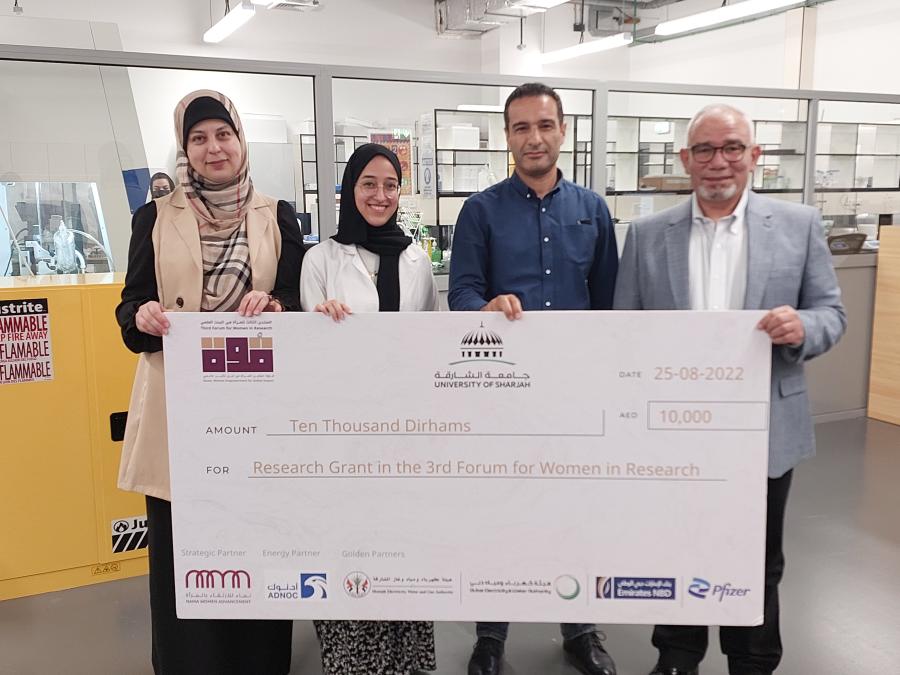- About
- Admissions
- Study at AUS
- Prospective Students
- Bachelor's Degrees
- Master's Degrees
- Doctoral Degrees
- Admission Publications
- International Students
- Contact Admissions
- Grants and Scholarships
- Sponsorship Liaison Services
- Testing Center
- New Student Guide
- File Completion
- New Student Orientation
- Payment Guide
- Executive Education
- Students with Disabilities
- Academics
- Life at AUS
- Research
- Contact Us
- Apply Now
- .

AUS graduate student develops model to prevent muscle atrophy
A graduate student at American University of Sharjah (AUS) has successfully developed a bio-compatible electrodes model to stimulate muscles suffering from nerve damage.
“Traumatic accidents may result in nerve damage, making it important to stimulate the injured muscles to avoid muscle degeneration and death. The idea is to implant the developed conductive, biocompatible electrodes inside the body to stimulate the muscles until the nerve regrows. The developed electrodes have overcome the limitations found in other similar electrodes, which are often made of rigid metals that harm biological tissues. The developed electrodes are made of flexible materials (polymers) doped with conductive materials (nanoparticles), which makes them conductive, flexible, mechanically suitable and biologically fit. This combination will stimulate the muscle, prevent muscle atrophy and not harm the soft biological tissues at the same time,” said Amaal Abdulraqeb Ali, a biomedical engineering graduate student in the College of Engineering (CEN).
She added: “The next step of this research would be evaluating the biocompatibility of the electrodes to prove their safety for use on human cells and investigating the long-term performance of the electrodes. This will provide a foundation to go for future testing in vitro (cells) and in vivo (animal models).”
The Master of Science in Biomedical Engineering (MSBME) offered at AUS is a dynamic, multidisciplinary program that prepares students for advanced careers and research in biomedical engineering. In her work, Ali has worked closely with research advisors from CEN and the College of Arts and Sciences.
“This research was conducted under the supervision of my advisors Dr. Mohammad Al-Sayah from the Department of Biology, Chemistry and Environmental Sciences at CAS; and Dr. Amani Al-Othman from the Department of Chemical and Biological Engineering and Dr. Hasan Al-Nashash from the Department of Electrical Engineering at CEN. The expertise of my advisor Dr. Al-Sayah guided me tremendously in material synthesis and characterization, while the expertise of my advisors Dr. Al-Nashash and Dr. Al-Othman guided me greatly in electrochemical testing and optimization of my system. It is only with this knowledge that we were able to go from material synthesis and characterization to electrode preparation and testing here at AUS,” she said.
Ali’s work has been commended in several forums, including being named one of the top 10 innovations recognized at the Gulf Petrochemicals and Chemicals Association (GPCA), and winning the Quwa Award at the Third Forum for Women in Research "Quwa: Women Empowerment for Global Impact.”
The 4.0 GPA master’s student is also a scientific illustrator, producing scientific illustrations for several of her research papers at AUS. She has also co-authored a paper with Dr. Al-Othman and Dr. Al-Sayah entitled “Multifunctional Stimuli-Responsive Hybrid Nanogels for Cancer Therapy: Current Status and Challenges” that was published in the high impact Journal of Controlled Release.
“I am grateful for the support from AUS, and I look forward to continuing my passion for research, particularly in nanomedicine. I would also be remiss not to thank my parents, my role models, whose endless love, support and encouragement have always been my source of strength in everything I do.”
The Master of Science in Biomedical Engineering (MSBME) program provides a stimulating academic environment that promotes excellence in teaching and research, helping its students to become competent, innovative and responsible professionals. Based on high standards similar to those followed in the United States, the MSBME curriculum features core courses in mathematics, anatomy and physiology, followed by elective courses in several biomedical engineering subdisciplines, including healthcare management and informatics, biomedical signals and devices, biomaterials and biofluidics.
For more information about the MSBME program, visit www.aus.edu/cen/msbme.

